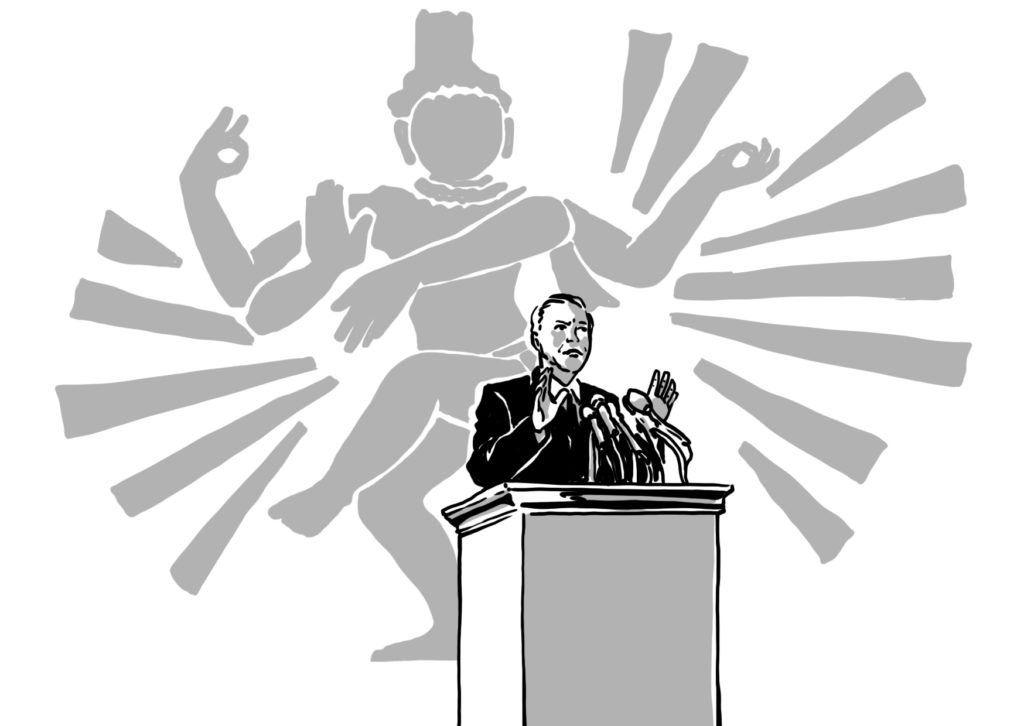India made government job and educational quotas for marginalized castes a constitutional right in 1949, but bitter divisions over who-gets-what remain persistent across many states. Are these protests intrinsically related to caste hierarchy, or do politics play a role?
Over the last two months, hundreds of thousands of Marathas have organized silent marches in various cities across the state of Maharashtra in demand of affirmative action quotas equal to those of marginalized castes. Despite the fact the Marathas form a politically powerful caste community, they claim to be tired of watching the government dole out coveted jobs and university spots to castes below them.
In the past, Marathas have successfully pressed the previous Congress-National Congress Party into granting them reservations, although the Supreme Court later overturned move. Other protests have achieved similar results. Last February, Jat rioters demanding quotas in Harayna sabotaged a water canal providing nearly half of New Delhi’s water supply. Fearing further agitation, the Harayna government promised them a pro-quota bill in the next assembly session.
Governments have to deal with the tireless demands of caste protestors, but politicians themselves are often to blame for the uprising. Given their history of indulging in upper caste complaints, politicians have too often sent the signal that they are willing to give up fair policies for votes. As long as caste is mobilized for political purposes, caste protests over quotas aren’t going anywhere.
For the government, quotas have proved to be Pandora’s box
Affirmative action policies were originally put in place to close caste divisions, not widen them. Social reformer Dr. B.R Ambedkhar built government jobs and public university quotas for Scheduled Castes (groups at the bottom of India’s ancient Hindu caste hierarchy) and Scheduled Tribes (rural communities excluded from the caste system) into India’s Constitution in 1949. It was a way to ensure a fair chance for India’s most marginalized groups, broadly referred to as Dalits.
However, Article 15 of the Constitution left eligibility for aid open to “other socially and educationally backward classes”. This led to governments vetting applications for a dizzying array of “Other Backward Class” (OBCs): backwards-forwards castes, creamy-layer castes, and more. Quotas for recognized groups are generally capped at 50 percent – but states such as Tamil Nadu now certify hundreds of castes as OBCs, reserving them up to 70 percent of all job and university placements. To avoid seeming disadvantage, some minority upper castes are now fighting tooth and nail for the same benefits.
High castes refuse to let benefits pass them by
India’s Constitution formally abolished caste in 1950 but Dalits and Scheduled Tribes continue to face discrimination. They experience far higher levels of illiteracy, landlessness, and bonded labour than any other group. Dalits are bound to perform jobs historically considered impure – like cleaning out sewers and disposing of animal carcasses. In contrast, Marathas are traditionally land-owning members of the ruling and military elite. They form a relatively affluent and dominant chunk of Maharastha’s population. Most possess cattle, land, and political clout.
Given this chasm in social and economic opportunity, it seems absurd that a Maratha would want to identify as a marginalized caste. But in the race to secure government and manufacturing jobs in India’s rapidly liberalizing economy, agrarian communities like Marathas often found themselves left in the dust. Young Marathas in particular are facing a frustratingly high unemployment rate.
A young woman addressing a rally in Navi, Mumbai in September captured the Marathas’ bitter mood. “Today, even if we score 90 per cent in our exams we don’t get admissions to colleges because of the monster of reservations,” she said. “My brother is sitting at home because there are no jobs left over.”
Caste protests over reservations are a recurring theme
Fierce protests have broken out over which-caste-gets-what many times before. Politicians only incite further disruption by giving in to quota demands.
Prime Minister Atal Behari Vajpayee secured a sizeable pool of voters by declaring job reservations for Jats on the eve of Harayna’s 1999 elections. When the Supreme Court barred the Jats from receiving job quotas last year, Jat MPs demanded the government challenge the order – or face the Jat community itself taking on the task.
In Gurajat, the affluent Patidar community has been incapacitating the state with fiery riots over job quotas – despite the fact they control much of India’s booming diamond cutting and polishing industry. Just earlier this week, the Gurajat government extended an offer to Patidar protestors to meet and discuss an amicable solution. Hardik Patel, leader of the protests, warned the government that they would not accept any “lollipops”, including scholarship schemes. The outcome of the negotiations is yet to be seen.
It’s time for politicians to stop preying on caste politics
Current quota protests make a mockery of D.R. Ambedkhar’s vision for an egalitarian India. Conceding to violence in order to keep a voting block happy is a knee-jerk reaction that does nothing but create incentive to challenge the system. As long as upper castes feel they can successfully lobby the government for quotas, they will do so.
State governments need to finally cap the list of castes eligible for quotas – regardless of how many voters will be lost. The power that certain castes have in numbers is certainly formidable, but it should not be manipulated for political advantage. Campaigns need to focus on policies that unite citizens, rather than divide them.
The stakes are particularly high in Maharashtra. The Kunbis, a deprived subsection of the Maratha caste already included in the reservation system, have faced discrimination at the hands of neighbouring Marathas for hundreds of years. Granting job quotas to their oppressors could bring simmering inter-caste tensions to a boiling point.
As the fictional heroine of Yenru Thaniyum, a recent Tamil film, said succinctly: “Caste is like God. It is omnipotent.” Politicians have the ability to remove it from politics – by ensuring reservations go to those who need them the most.
Isabela Vera is a Master of International Affairs candidate at the Hertie School and Executive Editor at the Governance Post. She is currently working as a research assistant for GIZ Nepal. Her research interests include gender-inclusive disaster management and social protection policy.

